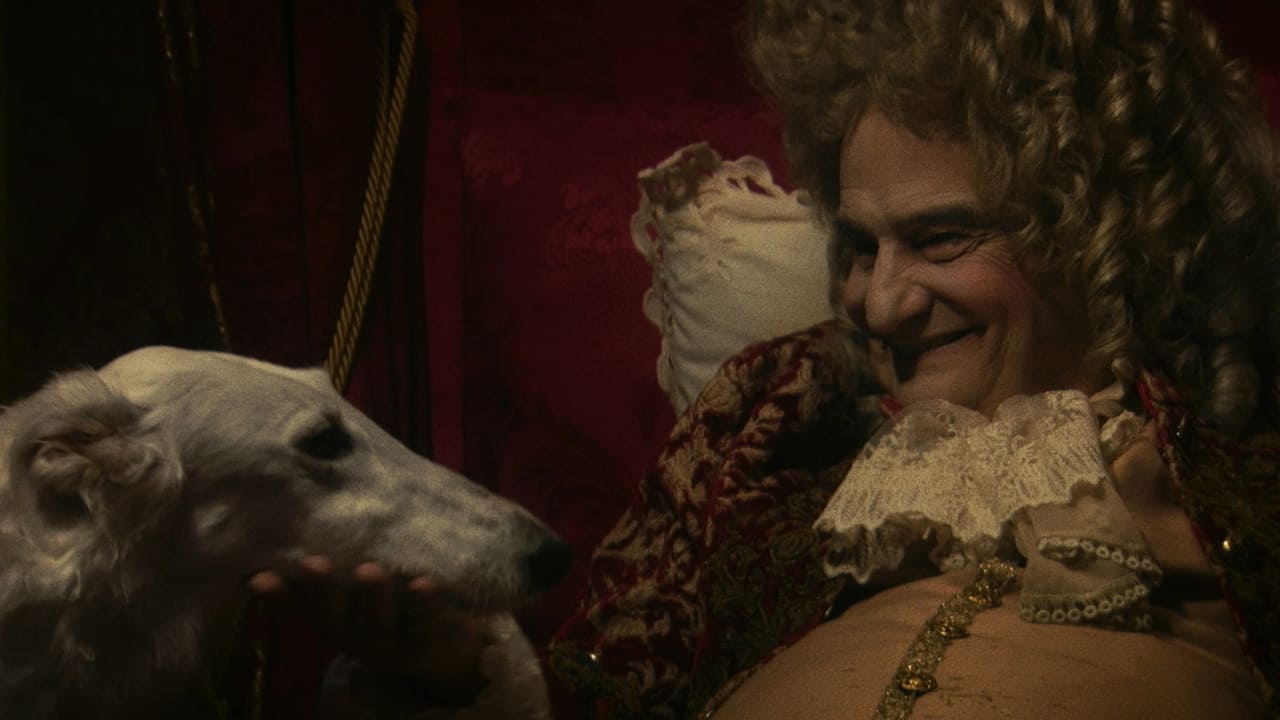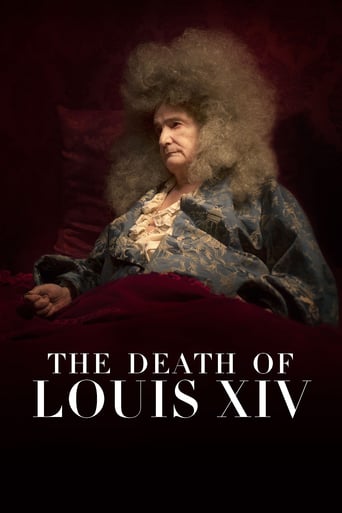

Every frame of this movie could be an art museum masterpiece. I can't remember seeing such a beautifully mounted production. The acting was finely nuanced. This is a study of regal life and death. It's interesting to note how far medicine has advanced since those days -- an advance we blithely take for granted.I loved this movie mainly because it is beautiful. The garments, the hairpieces, the attention to detail in every frame is just incredible. I liked that the camera lingered on the faces of the players so that we viewers could take in the beauty of it all. Few movies achieve this level of art. A feast for the eyes.
... View MoreThe French film La mort de Louis XIV was shown in the U.S. with the translated title The Death of Louis XIV (2016). The movie was co-written and directed by Albert Serra.The film starts the with the realization that the King Louis is very ill, and ends with his death. Louis XIV was called the "Sun King." The Greek sun god Apollo was immortal. Louis never claimed to be a god, but he certainly acted like one during his extremely long reign from 1642 to 1715. It's not surprising that the people of his court found it hard to believe that he could really be dying.We watch the king dying during the course of about a week. Director Serra gives us many, many details about his last days. The film was shot with a small cast and only the one interior setting--Louis's chamber, and the room directly outside it.For artistic and financial reasons, director Serra doesn't attempt to "open up" the movie. There are no scenes that take place outside the palace. No Three Musketeers. No Paris streets with beggars, filth, and noise. It's all quiet interior. The actors are frequently filmed in closeup. In order for a movie like this to work, the actors must be superb. Two of the three leading actors are: Patrick d'Assumçao, as Fagon, Louis's personal physician, and Marc Susini as Blouin, Louis's chief valet. Both actors are highly experienced professionals and they play their parts very well. Actually, the people they portray are also highly experienced professionals, who are dedicated to serving—and saving—the king.A movie like this will rise or fall based on the actor who portrays Louis. Jean-Pierre Léaud is perfect for the role. Not only is Léaud a immensely talented actor, but he even looks like portraits of Louis XIV. He was born to play this role, and he will be remembered for playing it for many years to come.After the movie ended, people had very different thoughts about it. Some said that they were tired of it after the first five minutes. Others said it was too long and/or too dark and/or too quiet. I can see, understand, and respect their point of view. However, my wife and I found the film profoundly moving and truly fascinating. We happen to enjoy long, quiet movies. We enjoy great acting. We were pleased to watch a great actor starring in a great role, being directed by a masterful filmmaker.We watched this movie at the wonderful Dryden Theatre at Rochester's George Eastman museum. If you're able to see this film, even on the small screen, I'd suggest you see it. Remember that it's long and slow. Remember that it's a masterpiece.
... View MoreI totally agree with the assessment of the first reviewer: it is a beautiful, claustrophobic film with very little "drama". One thing I would like to add is that the film depicts the dying king with great respect and dignity. Having touched by death of elderly family members in recent years, I appreciated the film's compassionate and dignified portrait of Louis XIV and the people who served him closely. There is no political intrigue or ugliness in the film. It quietly and matter-of-factly tells a story. So even though the film's main theme is death, it is not a depressing film and you leave the theater marveling the fine acting of Jean-Pierre Léaud.
... View MoreThe biggest wonder of this film is that it had most of its audience sitting all the way through. For almost 2 hours of every minute detail of the last days of Louis the 14th, the greatest king France has ever known. Truth is though we do follow every minute detail we don't really see every thing. In fact what we do see is mostly close ups of the faces of the protagonists (mostly the face of Jean-Pierre Leaud who does a superb work as the dying king betrayed by his body, but keeping his mind sharp to the very last moment), we often only get to hear whats taking place while we keep on seeing these close ups. The result is a very beautiful, claustrophobic film, with very little plot development and very little action. Theatrical in the most cinematographic way - namely it's very theatrical but we always get to see it through the eye of the camera, did I forget to mention loads of close ups. So I did stay focused all the way to the end. And I do appreciate the technical mastery of the director and the cinematographer. And the acting was first class. But there's too little of any other element that could make it into a real masterpiece.
... View More